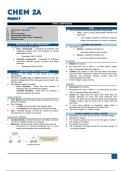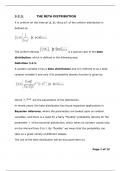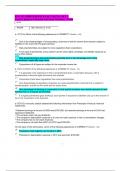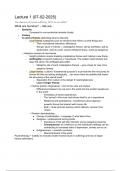Week One: Introduction
Globalization → extremely complex, multifaceted process
- No consensus among scholars about what globalization is
Modern sociology’s understanding of the world → Eurocentric bias
Societal relevance of this course
- Populism (because of migration/global culture, people feel like they lose a sense of
their identity)
- Cultural imperialism (Americanization)
- Religion (how do people make meaning of the world)
- Diffusion of neoliberalism (how are these affecting different countries)
- Protest movements against oppressive regimes (i.e. with the help of the internet)
- Practices and discourses about inclusion and exclusion (i.e. African art can only be
found in specific museums like Tropenmuseum, not in Stedelijk Museum →
hierarchy)
- Artists automatically framed and displayed based on their nationality → i.e.
Chinese feminists
- Subtle practices
Academic relevance
- Eric Wolf’s Europe and the People without History
- Rethink modern sociology and anthropology
- Methodological nationalism → focus on nation-states/coherent/separate whole
- So no focus on interconnectedness, linkages that exist between any
type of society
- Categorization of people into modern vs primitive, people with & without
history
- Implicit eurocentrism (we mostly read about Europe)
- People “without a history” are influence us but because they have no
history they aren’t talked about
- Periodization of history → from a European perspective again
Using Tuna as an example of what globalization exactly is about
- From local Italian trash (not a delicacy, pretty basic food) to global treasure (tuna
sushi auctioned for lots of money in Japan → cosmopolitan consumers)
- Why?
- In 1970, a world expo in Osaka where a local entrepreneur was catering sushi to the
fancy visitors on a conveyor belt → international press wrote about that
- World expos used to be very important to showcase to the world what your
culture was about
- Japanese community also brought sushi culture with them when migrating to the US
- Then slowly conquered the Western world
,What is globalisation?
We should keep in mind that no one, single best definition exists. Instead, each definition
allows one to see the different aspects of globalisation processes. The starting point of
globalization will vary depending on which definition you use.
- The different definitions of globalization bring about/highlight different problems
1. Increasing cross-border flows of goods, services, people, money, information and culture
- I.e. the sushi culture
- Everyone who looks Asian could work in a sushi place (even if they are not even
Japanese); this can be referred to as orientalism [vera: gosh I had this happen to me
when I was eating at an all-you-can-eat sushi place, the manager came up to me and
asked if I wanted to be a waiter there dfjfsdjflsfjsll - i declined]
Starting point: 20th century (possible critique - no technique to measure the flows before the
20th century + doesn’t say much about the movement of people, just flow of goods)
2. A long-term historical process of growing worldwide interconnectedness (Nederveen
Pieterse, 1995)
- I.e. the fact that tuna sushi is now popular and eaten around the world
Starting point: Start of history (i.e. crusades)
3. World-systems theory: the process, completed in the twentieth century, by which the
capitalist world-system spreads across the globe (Wallerstein 1974).
- American imperialism; US occupying Japan after WWII, so that’s also why they got
familiar with sushi + Japan copying capitalist institutions from the US (capitalist
modes of production, i.e. big Japanese multinational tuna producers)
Starting point: 15th century (colonialism)
4. World polity theory: the formation of a world society, composed of nations, international
organizations, and individuals with a distinct world culture (Lechner & Boli, 2005).
- Includes rules and scripts
- I.e. NGO’s that label tuna as sustainable or not
- I.e. World Trade Organization → trade deals on import/export of tuna
- Individual-level → global citizen → able to eat with chopsticks
Starting point: 19th century (Greenwich time standardization)
, 5. The intensification of consciousness of the world as a whole (Robertson 1992).
- Mental level, about awareness
- I.e. awareness of the existence of the tuna food culture
Starting point: 19th century
6. Deterritorialization: Cultural distancing from locality, e.g. because of migration,
mediatization and commodification (Appadurai 1990).
- Cultural not connected to place anymore → displacement of culture
- I.e. sushi now disconnected from Japan geographically
- Also becomes modified → California roll sushi (local adjustments) [Californians were
just WEAK]
- Americans also completely barbarized sushi by coming up with sushi pizza
(why???????)
Starting point: not necessarily sure, but coincides with migration flows of people
● Many more definitions of globalisation exist
● Some definitions are interrelated, for example, deterritorialization (6) is enabled by
flows of cultural good and services (1); intensification of consciousness of the world
as a whole (3) is enabled by the spread of the capitalist world system
● Some definitions stem from specific theoretical traditions, for example,
world-systems theory
● Other definitions, (1) and (2) in particular, leave room for a variety of theoretical
traditions.
Guillen’s five debates or the five key debates within globalization studies
(1) Is it really happening? (sushi could be a simple outlier)
- NL mostly trades with countries that are closeby, like Germany
(2) Does it produce convergence?
(3) Does it undermine the authority of nation-states?
(4) Is globality different from modernity?
(5) Is a global culture in the making?
Globalization → extremely complex, multifaceted process
- No consensus among scholars about what globalization is
Modern sociology’s understanding of the world → Eurocentric bias
Societal relevance of this course
- Populism (because of migration/global culture, people feel like they lose a sense of
their identity)
- Cultural imperialism (Americanization)
- Religion (how do people make meaning of the world)
- Diffusion of neoliberalism (how are these affecting different countries)
- Protest movements against oppressive regimes (i.e. with the help of the internet)
- Practices and discourses about inclusion and exclusion (i.e. African art can only be
found in specific museums like Tropenmuseum, not in Stedelijk Museum →
hierarchy)
- Artists automatically framed and displayed based on their nationality → i.e.
Chinese feminists
- Subtle practices
Academic relevance
- Eric Wolf’s Europe and the People without History
- Rethink modern sociology and anthropology
- Methodological nationalism → focus on nation-states/coherent/separate whole
- So no focus on interconnectedness, linkages that exist between any
type of society
- Categorization of people into modern vs primitive, people with & without
history
- Implicit eurocentrism (we mostly read about Europe)
- People “without a history” are influence us but because they have no
history they aren’t talked about
- Periodization of history → from a European perspective again
Using Tuna as an example of what globalization exactly is about
- From local Italian trash (not a delicacy, pretty basic food) to global treasure (tuna
sushi auctioned for lots of money in Japan → cosmopolitan consumers)
- Why?
- In 1970, a world expo in Osaka where a local entrepreneur was catering sushi to the
fancy visitors on a conveyor belt → international press wrote about that
- World expos used to be very important to showcase to the world what your
culture was about
- Japanese community also brought sushi culture with them when migrating to the US
- Then slowly conquered the Western world
,What is globalisation?
We should keep in mind that no one, single best definition exists. Instead, each definition
allows one to see the different aspects of globalisation processes. The starting point of
globalization will vary depending on which definition you use.
- The different definitions of globalization bring about/highlight different problems
1. Increasing cross-border flows of goods, services, people, money, information and culture
- I.e. the sushi culture
- Everyone who looks Asian could work in a sushi place (even if they are not even
Japanese); this can be referred to as orientalism [vera: gosh I had this happen to me
when I was eating at an all-you-can-eat sushi place, the manager came up to me and
asked if I wanted to be a waiter there dfjfsdjflsfjsll - i declined]
Starting point: 20th century (possible critique - no technique to measure the flows before the
20th century + doesn’t say much about the movement of people, just flow of goods)
2. A long-term historical process of growing worldwide interconnectedness (Nederveen
Pieterse, 1995)
- I.e. the fact that tuna sushi is now popular and eaten around the world
Starting point: Start of history (i.e. crusades)
3. World-systems theory: the process, completed in the twentieth century, by which the
capitalist world-system spreads across the globe (Wallerstein 1974).
- American imperialism; US occupying Japan after WWII, so that’s also why they got
familiar with sushi + Japan copying capitalist institutions from the US (capitalist
modes of production, i.e. big Japanese multinational tuna producers)
Starting point: 15th century (colonialism)
4. World polity theory: the formation of a world society, composed of nations, international
organizations, and individuals with a distinct world culture (Lechner & Boli, 2005).
- Includes rules and scripts
- I.e. NGO’s that label tuna as sustainable or not
- I.e. World Trade Organization → trade deals on import/export of tuna
- Individual-level → global citizen → able to eat with chopsticks
Starting point: 19th century (Greenwich time standardization)
, 5. The intensification of consciousness of the world as a whole (Robertson 1992).
- Mental level, about awareness
- I.e. awareness of the existence of the tuna food culture
Starting point: 19th century
6. Deterritorialization: Cultural distancing from locality, e.g. because of migration,
mediatization and commodification (Appadurai 1990).
- Cultural not connected to place anymore → displacement of culture
- I.e. sushi now disconnected from Japan geographically
- Also becomes modified → California roll sushi (local adjustments) [Californians were
just WEAK]
- Americans also completely barbarized sushi by coming up with sushi pizza
(why???????)
Starting point: not necessarily sure, but coincides with migration flows of people
● Many more definitions of globalisation exist
● Some definitions are interrelated, for example, deterritorialization (6) is enabled by
flows of cultural good and services (1); intensification of consciousness of the world
as a whole (3) is enabled by the spread of the capitalist world system
● Some definitions stem from specific theoretical traditions, for example,
world-systems theory
● Other definitions, (1) and (2) in particular, leave room for a variety of theoretical
traditions.
Guillen’s five debates or the five key debates within globalization studies
(1) Is it really happening? (sushi could be a simple outlier)
- NL mostly trades with countries that are closeby, like Germany
(2) Does it produce convergence?
(3) Does it undermine the authority of nation-states?
(4) Is globality different from modernity?
(5) Is a global culture in the making?










